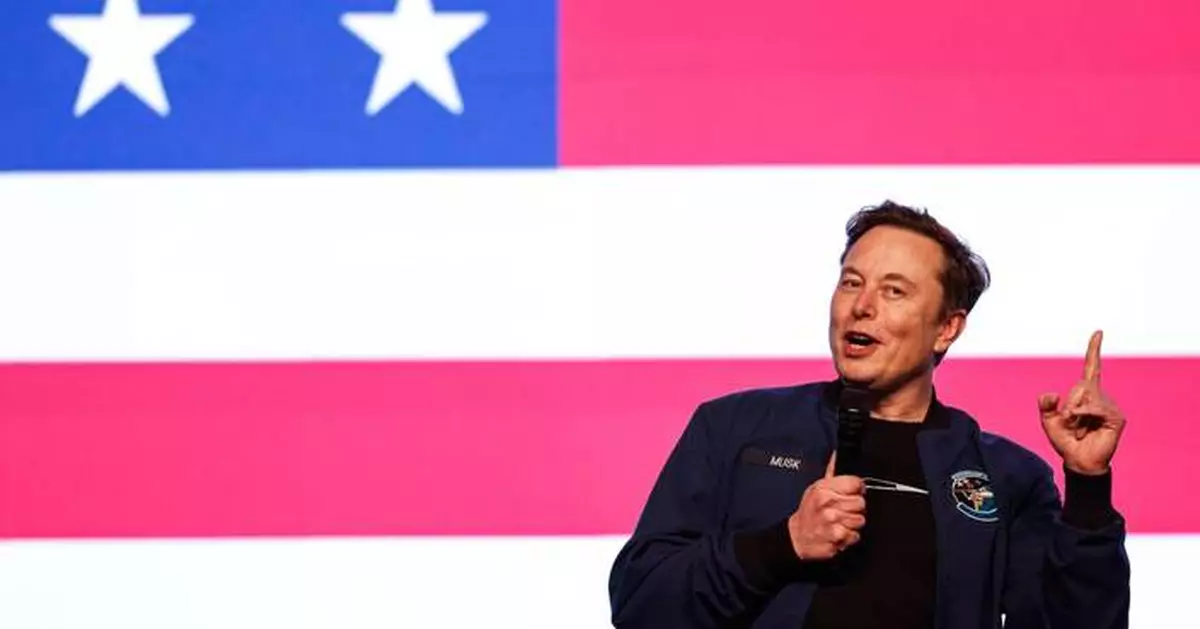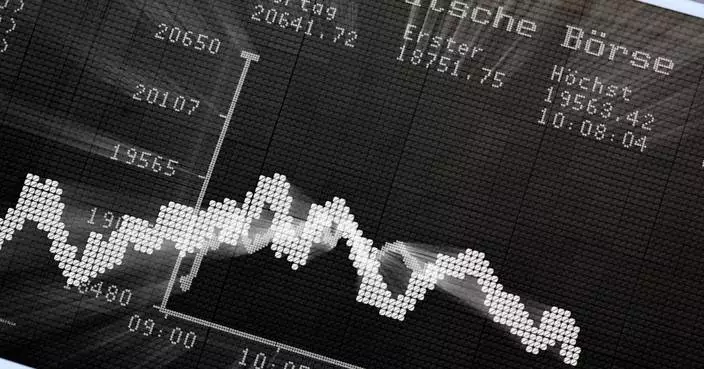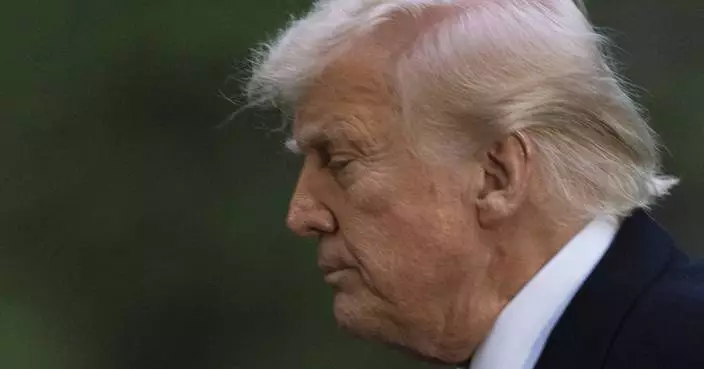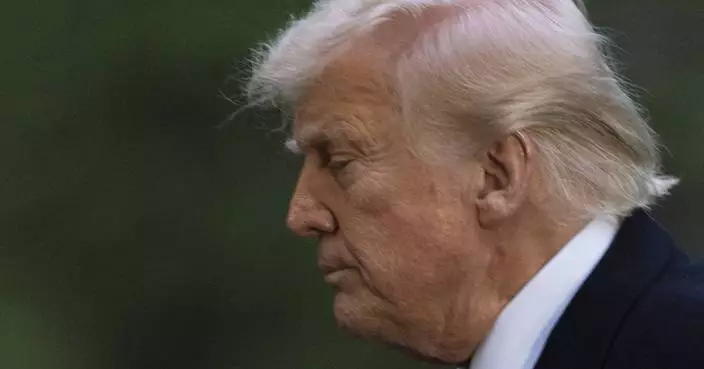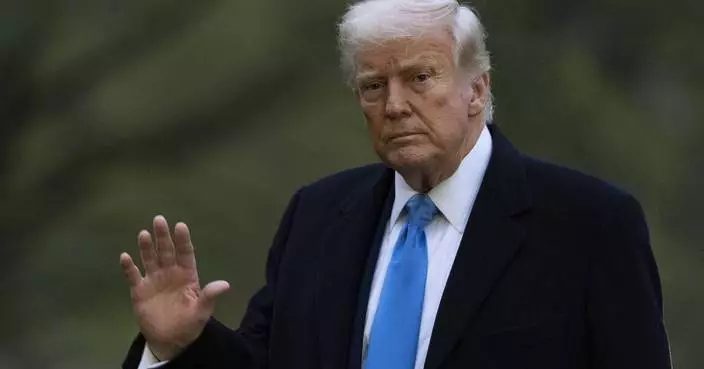WASHINGTON (AP) — President Donald Trump said Thursday that Elon Musk would likely leave his administration in “a few months,” the clearest sign that his most powerful and disruptive adviser will be wrapping up his work inside the government.
Trump told reporters aboard Air Force One that “Elon is fantastic” but he has “a number of companies to run."
“I want him to stay as long as possible," he said. "There’s going to be a point where he’s going to have to leave.”
Musk has spearheaded the Department of Government Efficiency, which is playing a leading role in downsizing and overhauling the federal government. Trump said that work would continue within various agencies.
The Republican president's comments came after a steady drumbeat of suggestions over the last week that Musk's time was limited. Musk also faced a setback Tuesday in Wisconsin, where voters rejected his choice for a state Supreme Court candidate despite more than $21 million in personal donations and his campaign appearance over the weekend. There are more problems for the billionaire entrepreneur at Tesla, his electric automaker, which saw a 13% drop in sales in the first three months of the year.
The White House has not disclosed any timeline for closing down DOGE, and the government cost-cutting organization was never supposed to become a permanent fixture in Washington. But it could be reaching a conclusion faster than anticipated. DOGE was originally intended to operate until July 4, 2026.
Now there are signs that it already is winding down. DOGE employees have been shifted to various federal agencies, which are supposed to take the lead on cutting costs. Government-wide layoffs are underway to accomplish some of the goals laid out by Musk and Trump.
“We think probably over the next two or three months, we’ll be pretty much satisfied with the people that are working hard and want to be members of the administration,” Trump said last week.
The potential end of DOGE does not mean Trump will stop shaking up Washington. But it appears the administration’s efforts will be entering a new phase that is less focused on Musk, whose chain saw-wielding work as a presidential adviser made him a political lightning rod.
DOGE was initially envisioned as an independent advisory panel, with Musk sharing leadership with Vivek Ramaswamy, a biotech entrepreneur. Ramaswamy dropped out and is running for Ohio governor, and DOGE became part of the government. It was stocked with Musk's allies, who were dispatched throughout the bureaucracy to cancel contracts, access sensitive data and push for cuts.
Musk presumably has a ticking clock on his tenure. He was hired as a special government employee, which means he can only work 130 days in a 365-day time period.
“I think we will have accomplished most of the work required to reduce the deficit by a trillion dollars within that time frame,” Musk told Bret Baier of Fox News on March 27. So far DOGE is well short of that target, according to its own calculations, which have been criticized as inflated and inaccurate.
Musk did not commit to leaving the administration by any particular date, and it is unclear how the administration is tracking Musk’s time. On May 30, it will be 130 days since Trump’s inauguration on Jan. 20.
Trump told reporters on Monday in the Oval Office that “I’d keep him as long as I could keep him” and “he’s a very talented guy.”
The Republican president was known for explosive breakups with top advisers during his first term, but anyone hoping for such a split with Musk has been disappointed.
“I want Elon to stay as long as possible," Trump said Thursday. “Number one, I like him, number two, he’s doing a great job. Number three, he is a patriot, that’s why he’s doing this.”
Once Musk leaves, Trump said "the secretaries will take totally over,” meaning the Senate-confirmed leaders of various agencies, but “DOGE will stay active”
That was a somewhat different message than Trump had on Monday. At that point, he said Cabinet officials have worked closely with Musk and may keep some of the DOGE people at their agencies.
“But at a certain point I think it will end,” Trump said.
Musk's poll numbers lag behind Trump's, which Democrats believe they were able to use to their advantage in Wisconsin.
Susan Crawford defeated Brad Schimel, who Musk supported, and ensured the state Supreme Court's liberal majority.
In the closing days of that campaign, Musk described the race as “important for the future of civilization.” He struck a different tone afterward.
“I expected to lose, but there is value to losing a piece for a positional gain,” Musk wrote on X at 3:13 a.m.
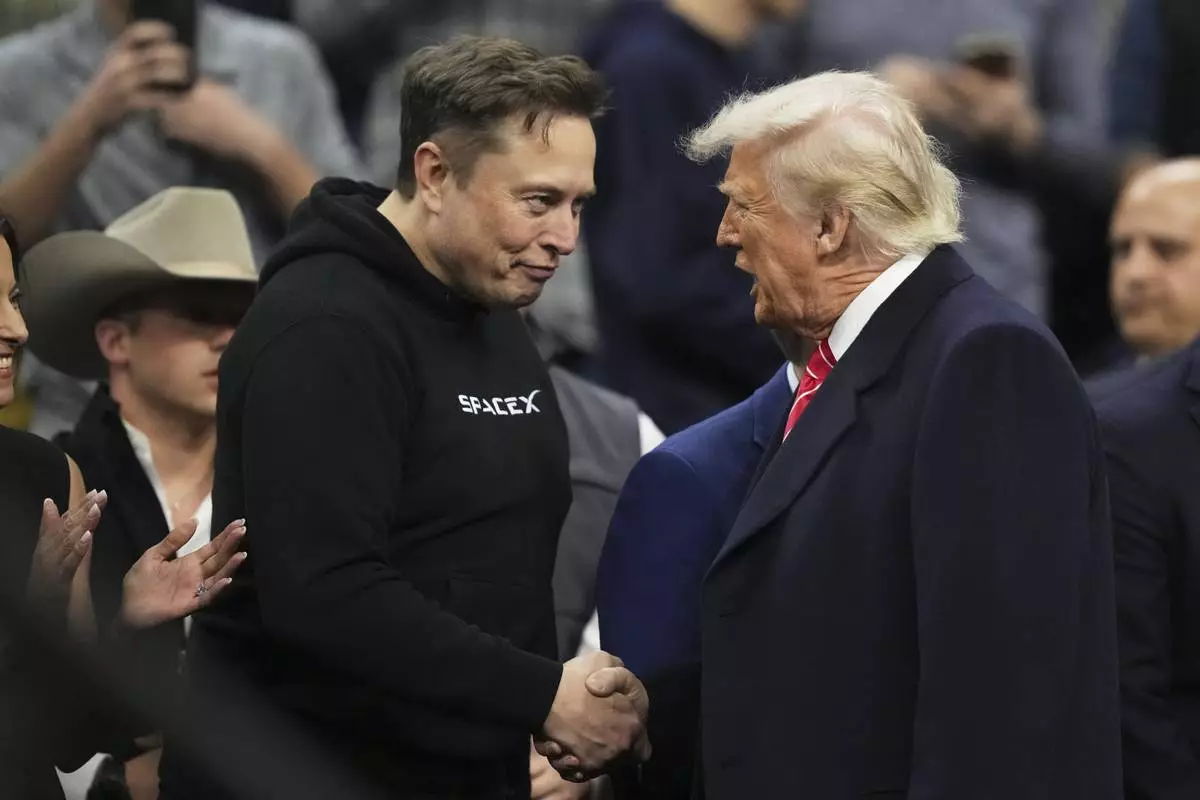
Elon Musk, left, shakes hands with President Donald Trump at the finals for the NCAA wrestling championship, Saturday, March 22, 2025, in Philadelphia. (AP Photo/Matt Rourke)
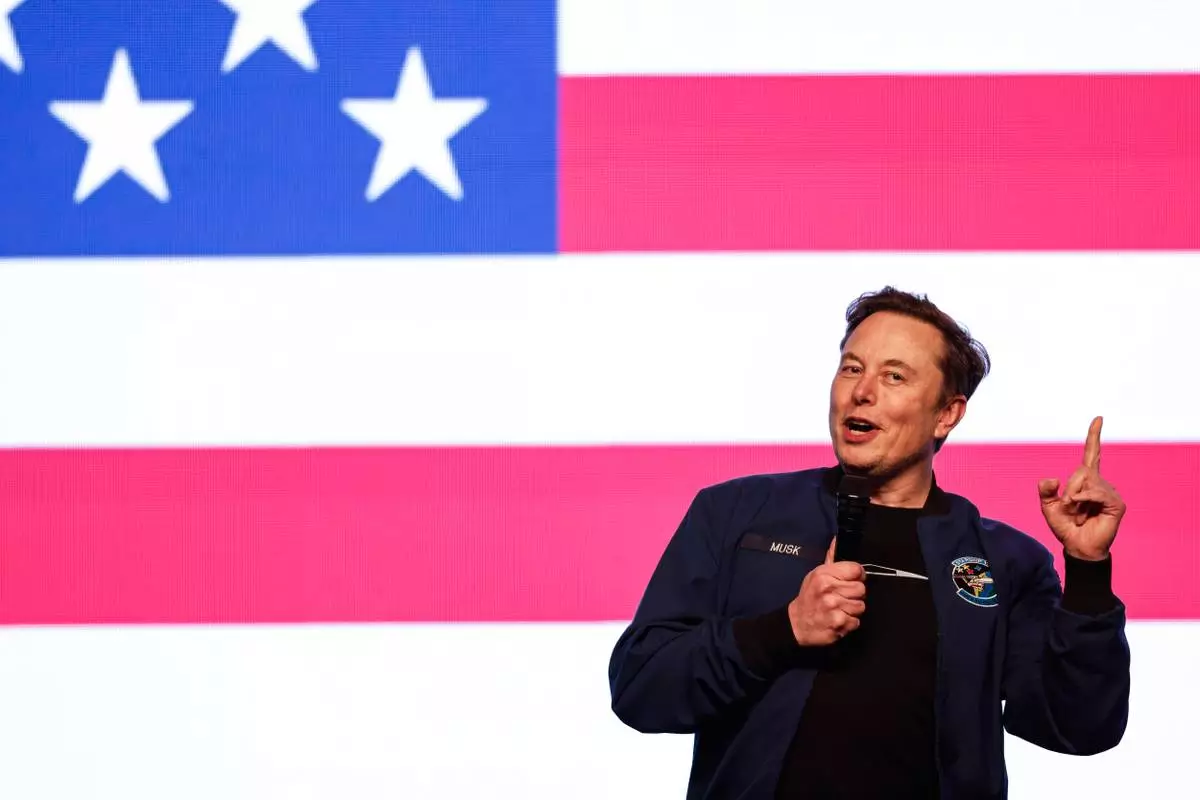
Elon Musk speaks at a town hall Sunday, March 30, 2025, in Green Bay, Wis. (AP Photo/Jeffrey Phelps)
Wall Street is sinking again, following other global markets, as worries deepen about whether President Donald Trump’s trade war will torpedo the global economy. European and Asian shares saw dramatic losses, the leading U.S. index is flirting with bear market territory, and oil prices are sagging. Trump says he won’t back down on his sweeping new tariffs.
Countries are scrambling to figure out how to respond to the tariffs, with China and others retaliating quickly.
Trump’s tariff blitz fulfilled a key campaign promise as he acted without Congress to redraw the rules of the international trading system. It was a move decades in the making for Trump, who has long denounced foreign trade deals as unfair to the U.S.
The higher rates are set to be collected beginning Wednesday, ushering in a new era of economic uncertainty with no clear end in sight.
Here's the latest:
Wall Street is sinking again, following other global markets, as worries deepen about whether Trump’s trade war will torpedo the global economy.
The S&P 500 fell 3.8% in early trading Monday, coming off its worst week since COVID began crashing the global economy in March 2020.
The Dow Jones Industrial Average was down 1,200 points, and the Nasdaq composite was 4% lower.
European markets saw losses of 4% or more. In Asia, stocks in Hong Kong plunged 13.2% for their worst day since 1997. Japan’s Nikkei index tumbled nearly 8%.
European Commission President Ursula von der Leyen says the European Union is looking to do more business elsewhere in the world as President Trump’s tariffs hit international trade.
She said Monday that the EU is also is setting up a taskforce to monitor any dumping on its markets that might happen as trade patterns change.
“We will focus like a laser beam on the 83% of global trade that is beyond the United States. Vast opportunities,” von der Leyen said. After deals already done with Mexico and Switzerland, she said, “we’re working on India, Thailand, Malaysia, Indonesia and many others.”
Von der Leyen says the taskforce will help to monitor any unexpected surges in imports and “protect ourselves against indirect effects through trade diversion.”
The European Commission negotiates trade deals and disputes on behalf of the 27 EU member countries.
Von der Leyen insists the EU still wants a deal with the Trump administration, but that “we are preparing a potential list for retaliation, and other measures for retaliation, if this is necessary.”
JPMorgan Chase CEO Jamie Dimon says the Trump administration’s trade policies will likely result in higher prices for both imported and domestic goods and services, weighing on an already slowing U.S. economy.
In his annual letter to shareholders, released Monday, Dimon said the U.S. economy already faced a number of challenges: sticky inflation, geopolitical tensions, Federal Reserve policy including still-high interest rates and high fiscal deficits. Dimon also said that many stocks in the market have been priced too high.
The outspoken and influential CEO often comments on both domestic and international issues.
“Whether or not the menu of tariffs causes a recession remains in question, but it will slow down growth,” Dimon wrote, while also saying “I still have an abiding faith in America.”
The financial firm said a recession has become more likely even if Trump retreats from his trade policies.
Goldman Sachs also reduced its expectations for economic growth “following a sharp tightening in financial conditions, foreign consumer boycotts, and a continued spike in policy uncertainty that is likely to depress capital spending by more than we had previously assumed.”
But even meeting those expectations “would now require a large reduction in the tariffs scheduled to take effect on April 9.”
The dispute over tariffs has caused some fracturing within Trump’s political coalition.
Hedge fund manager Bill Ackman said the president was “launching a global economic war against the whole world at once” and urged him to “call a time out.”
“We are heading for a self-induced, economic nuclear winter,” he wrote on X on Sunday.
Top White House economic adviser Kevin Hassett told Fox News on Monday morning that Ackman should “ease off the rhetoric a little bit.”
Hassett said critics were exaggerating the impact of trade disputes and talk of an “economic nuclear winter” was “completely irresponsible rhetoric.”
The president showed no interest in changing course despite turmoil in global markets.
He said other countries had been “taking advantage of the Good OL’ USA” on international trade.
“Our past ‘leaders’ are to blame for allowing this, and so much else, to happen to our Country,” he wrote on Truth Social. “MAKE AMERICA GREAT AGAIN!”
Trump criticized China for increasing its own tariffs and “not acknowledging my warning for abusing countries not to retaliate.”
Markets on Wall Street are poised to open the week with more significant losses as fears mount that U.S. tariffs announced by President Donald Trump would lead to a global economic slowdown.
European and Asian shares saw dramatic losses, while futures for the S&P 500 index fell 2.7% in premarket trading. The index was down 17.4% from its recent high in February as of the end of last week. A drop of 20% or more from a recent high is what market observers consider a bear market.
Oil prices sank again, briefly dipping below $60 a barrel for the first time since 2021.
Futures for the Dow Jones Industrial Average slipped 2.4%. Nasdaq futures fell 3%.
Hong Kong Financial Secretary Paul Chan says the current volatility in the market does not warrant any drastic measures to be taken, vowing the city will remain a free port.
After the city’s stock market slumped 13.2% on Monday, Chan told reporters that it was functioning in an orderly manner, with substantial selling and buying interests. But the U.S. tariffs will inevitably cause market fluctuations and retaliatory measures and interest rate policy from other countries will trigger more volatile capital flows.
He blasted the latest U.S. tariffs as “bullying and unreasonable,” saying they have disrupted global supply chains and severely impacted the global economic recovery process.
Hong Kong, a former British colony which returned to China in 1997, enjoys semiautonomy that allows its policies and economic system to be different from mainland China’s.
Germany has reported a large increase in exports to the United States in February, ahead of U.S. President Donald Trump’s announcement of sweeping tariffs.
Germany has Europe’s biggest economy and is a leading exporter. Last year, the United States was its biggest single trading partner for the first time in nearly a decade, displacing China.
The Federal Statistical Office said Monday that Germany’s exports to the U.S. were up 8.5% in February compared with the previous month, at 14.2 billion euros ($15.6 billion). German exports to the entire world, including other EU nations, were up 1.8% in the same period at 131.6 billion euros.
The head of Germany’s exporters association, the BGA, said the February increase “must not deceive us” as the rise in exports to the U.S. was due to “anticipatory effects.”
Dirk Jandura said in a statement that “U.S. firms bunkered and German firms moved deliveries forward.”
He added that “Germany and the EU must quickly find their role in the new world order” and “approach the global South with pragmatic offers.”
Jandura argued that “the sweeping U.S. blow offers a unique opportunity to position Europe as a reliable and trustworthy partner.”
Israeli Prime Minister Benjamin Netanyahu will meet U.S. President Donald Trump in Washington Monday, becoming the first foreign leader to visit since Trump unleashed tariffs on countries around the world.
Whether Netanyahu’s visit succeeds in bringing down or eliminating Israel’s 17% tariff remains to be seen, but how it plays out could set the stage for how other world leaders try to address the new tariffs.
Netanyahu’s office has put the focus of his hastily organized Washington visit on the tariffs, while stressing that the two leaders will discuss major geopolitical issues including the war in Gaza, tensions with Iran, Israel-Turkey ties and the International Criminal Court.
Eytan Gilboa, an expert on U.S.-Israel relations, said he expected Trump to use the tariffs as leverage to force out concessions from Netanyahu. Trump may pressure Netanyahu to move toward ending the war in Gaza, at the very least through some interim truce with Hamas that would pause the fighting and free more hostages.
In a preemptive move last week, Israel announced that it was removing all tariffs on goods from the U.S., mostly on imported food and agricultural products.
Germany’s economy minister says the premise of U.S. President Donald Trump’s wide-ranging tariffs is “nonsense,” and he is arguing that Europe is in a strong position.
Robert Habeck, who is also vice chancellor in Germany’s outgoing government, said as he arrived at a meeting of European Union trade ministers in Luxembourg Monday that he and his colleagues must act “calmly, prudently but also clearly and with determination.”
He said that means “being clear that we are in a strong position — America is in a position of weakness.” He argued that “we don’t have time pressure now,” but the U.S. does.
Habeck said it’s important for the EU to stick together, arguing that attempts by individual countries to win exemptions haven’t worked in the past. He stressed the importance of trade agreements and contacts with other regions of the world, such as South America, Asia and the Pacific.
The German minister said of Trump’s tariffs that “even the basis of the calculation is nonsense: The assumption that a trade budget surplus or deficit is a problem in itself is a wrong estimation.”
Indonesia says it won't retaliate against Trump’s 32% tariff but will pursue diplomacy and negotiations to seek mutually beneficial solutions.
Indonesia, which had an $18 billion trade surplus with the U.S. last year, will gather input from business leaders to create a strategy for addressing the tariffs and find ways to reduce the deficit, Coordinating Economic Affairs Minister Airlangga Hartarto said Monday.
“We will increase the volume of purchases so that the $18 billion trade deficit can be reduced,” Hartarto said.
China on Monday accused the United States of unilateralism, protectionism and economic bullying with tariffs.
“Putting ‘America First’ over international rules is a typical act of unilateralism, protectionism and economic bullying,” Foreign Affairs spokesperson Lin Jian told reporters.
Last week, Trump put an additional 34% tariff on Chinese goods, on top of two rounds of 10% tariffs already declared in February and March, which Trump said was due to Beijing’s role in the fentanyl crisis. China and other governments retaliated quickly. China announced its own 34% tariff rate on U.S. goods.
Lin said the new tariffs harmed the stability of global production and supply chains and seriously impacted the world’s economic recovery.
“Pressure and threats are not the way to deal with China. China will firmly safeguard its legitimate rights and interests,” Lin added.
European shares dropped in early trading, with Germany’s DAX falling 6.5% to 19,311.29. In Paris, the CAC 40 shed 5.7% to 6,861.27, while Britain’s FTSE 100 lost 4.5% to 7,694.00.
South Korea’s top trade negotiator will visit Washington this week to express Seoul’s concerns over the Trump administration’s increased tariffs and discuss ways to mitigate their negative impact on South Korean businesses.
South Korea’s Ministry of Trade, Industry and Energy said Monday that its minister of trade, Inkyo Cheong, plans to meet with various U.S. officials, including U.S. Trade Representative Jamieson Greer.
The ministry says Cheong aims to gather detailed information on the Trump administration’s trade policies and engage in discussions to reduce the 25% tariffs placed on South Korean products.
Chinese government officials met business representatives from Tesla, GE Healthcare and other U.S. companies on Sunday. It called on them to issue “reasonable” statements and take “concrete actions” on addressing the issue of tariffs.
“The United States in recent days has used all sorts of excuses to announce indiscriminate tariffs on all trading partners, including China, severely harming the rules-based multilateral trade system,” said Ling Ji, a vice minister of commerce, at the meeting with 20 U.S. companies.
“China’s countermeasures are not only a way to protect the rights and interests of companies, including American ones, but are also to urge the U.S. to return to the right path of the multilateral trading system," Ling added.
Ling also promised that China would remain open to foreign investment, according to a readout of the meeting from the Ministry of Commerce.
Malaysia’s Trade Minister Zafrul Abdul Aziz said his country wants to forge a united response from Southeast Asia to the sweeping U.S. tariffs.
Malaysia, which is the chair of the Association of Southeast Asian Nations this year, will lead the regional bloc’s special Economic Ministers’ Meeting on April 10 in Kuala Lumpur to discuss the broader implication of the tariff measures on regional trade and investment, Zafrul told a news conference on Monday.
“We are looking at the investment flow, macroeconomic stability and ASEAN's coordinated response to this tariff issue,” Zafrul said.
ASEAN leaders will also meet to discuss member states’ strategies and to mitigate potential disruptions to regional supply chain networks.
Pakistan plans to send a government delegation to Washington this month to discuss how to avoid the 29% tariffs imposed by the U.S. on imports from Pakistan, officials said Monday.
The development came two days after Pakistan’s prime minister asked its finance minister to send him recommendations for resolving the issue. The U.S. imports around $5 billion worth of textiles and other products from Pakistan, which heavily relies on loans from the International Monetary Fund and others.
The Pakistan Stock Exchange fell rapidly on Monday. The exchange suspended trading for an hour after a 5% drop in its main KSE-30 index.
Middle East stock markets tumbled as they struggled with the dual hit of the new U.S. tariffs and a sharp decline in oil prices, squeezing energy-producing nations that rely on those sales to power their economies and government spending.
Benchmark Brent crude is down by nearly 15% over the last five days of trading, with a barrel of oil costing just over $63. That’s down nearly 30% from a year ago, when a barrel cost over $90.
That cost per barrel is far lower than the estimated break-even price for producers. That’s coupled with the new tariffs, which saw the Gulf Cooperation Council states of Bahrain, Kuwait, Oman, Qatar, Saudi Arabia and the United Arab Emirates hit with 10% tariffs. Other Mideast nations face higher tariffs, like Iraq at 39% and Syria at 41%.
The Dubai Financial Market exchange fell 5% as it opened for the week. The Abu Dhabi Securities Exchange fell 4%.
Markets that opened Sunday saw losses as well. Saudi Arabia’s Tadawul stock exchange fell over 6% in trading. The giant of the exchange, Saudi Arabia’s state-owned oil company Aramco, fell over 5% on its own, wiping away billions in market capitalization for the world’s sixth-most-valuable company.
Beijing struck a note of confidence on Monday even as markets in Hong Kong and Shanghai tumbled.
“The sky won’t fall. Faced with the indiscriminate punches of U.S. taxes, we know what we are doing and we have tools at our disposal," wrote The People's Daily, the Communist Party's official mouthpiece.
China announced a slew of countermeasures on Friday evening aimed at Trump’s tariffs, including its own 34% tariffs on all goods from the U.S. set to go in effect on Wednesday.
The Australian dollar fell below 60 U.S. cents on Monday for the first time since the early months of the COVID-19 pandemic.
The drop reflected concerns over the Chinese economy and market expectations for four interest rate cuts in Australia this calendar year, Australian Treasurer Jim Chalmers said.
“What our modeling shows is that we expect there to be big hits to American growth and Chinese growth and a spike in American inflation as well,” Chalmers said.
“We expect more manageable impacts on the Australian economy, but we still do expect Australian GDP to take a hit and we expect there to be an impact on prices here as well,” he added.
The Trump administration assigned Australia the minimum baseline 10% tariff on imports in the the United States. The U.S. has enjoyed a trade surplus with Australia for decades.
Indian stocks fell sharply on Monday, seeing their biggest single-day drop in percentage terms since March 2020 amid the pandemic.
The benchmark BSE Sensex and the Nifty 50 index both dropped about 5% after trading opened but then recovered slightly. Both were later trading down about 4%.
President Donald Trump said Sunday that he won’t back down on his sweeping tariffs on imports from most of the world unless countries even out their trade with the U.S., digging in on his plans to implement the taxes that have sent financial markets reeling, raised fears of a recession and upended the global trading system.
Speaking to reporters aboard Air Force One, Trump said he didn’t want global markets to fall, but also that he wasn’t concerned about the massive sell-off either, adding, “sometimes you have to take medicine to fix something.”
His comments came as global financial markets appeared on track to continue sharp declines once trading resumes Monday, and after Trump’s aides sought to soothe market concerns by saying more than 50 nations had reached out about launching negotiations to lift the tariffs.
“I spoke to a lot of leaders, European, Asian, from all over the world,” Trump said. “They’re dying to make a deal. And I said, we’re not going to have deficits with your country. We’re not going to do that, because to me a deficit is a loss. We’re going to have surpluses or at worst, going to be breaking even.”
Asian markets plunged on Monday following last week’s two-day meltdown on Wall Street, and U.S. President Donald Trump said he won’t back down on his sweeping tariffs on imports from most of the world unless countries even out their trade with the U.S.
Tokyo’s Nikkei 225 index lost nearly 8% shortly after the market opened on Monday. By midday, it was down 6%. Hong Kong’s Hang Seng dropped 9.4%, while the Shanghai Composite index was down 6.2%, and South Korea’s Kospi lost 4.1%.
U.S. futures also signaled further weakness.
Market observers expect investors will face more wild swings in the days and weeks to come, with a short-term resolution to the trade war appearing unlikely.

Currency traders work near a screen showing the Korea Composite Stock Price Index (KOSPI), top left, and the foreign exchange rate between U.S. dollar and South Korean won, top center, at the foreign exchange dealing room of the KEB Hana Bank headquarters in Seoul, South Korea, Monday, April 7, 2025. (AP Photo/Ahn Young-joon)
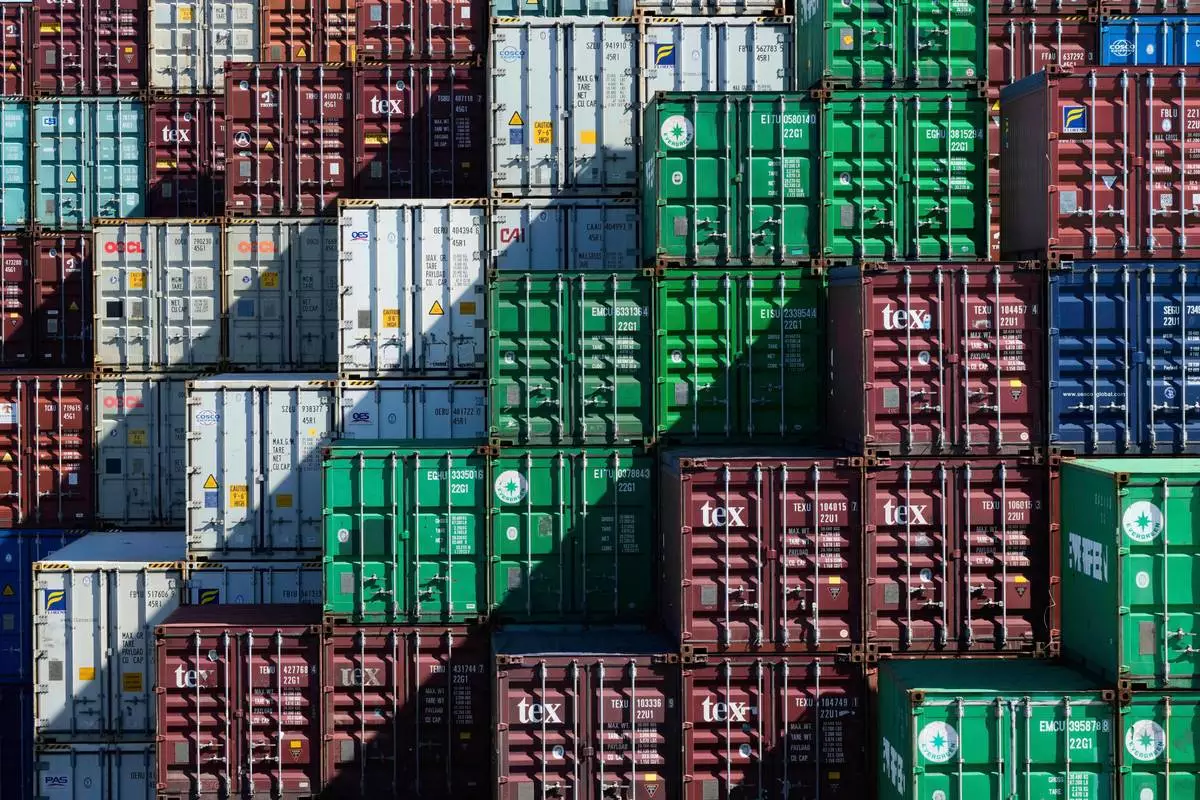
Shipping containers are stacked at Port Botany in Sydney, Australia, Monday, April 7, 2025. (AP Photo/Rick Rycroft)
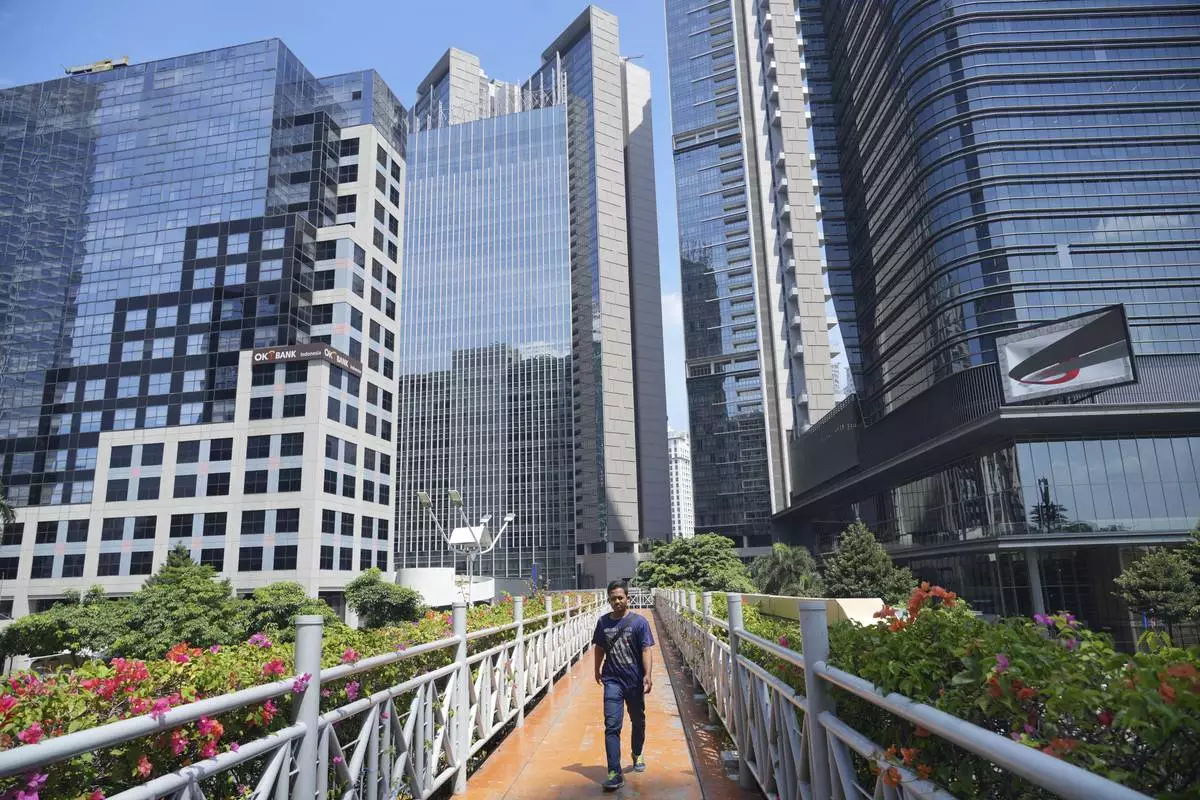
A man walks on a pedestrian bridge as tall buildings are seen in the background at the main business district in Jakarta, Indonesia, Monday, April 7, 2025. (AP Photo/Tatan Syuflana)
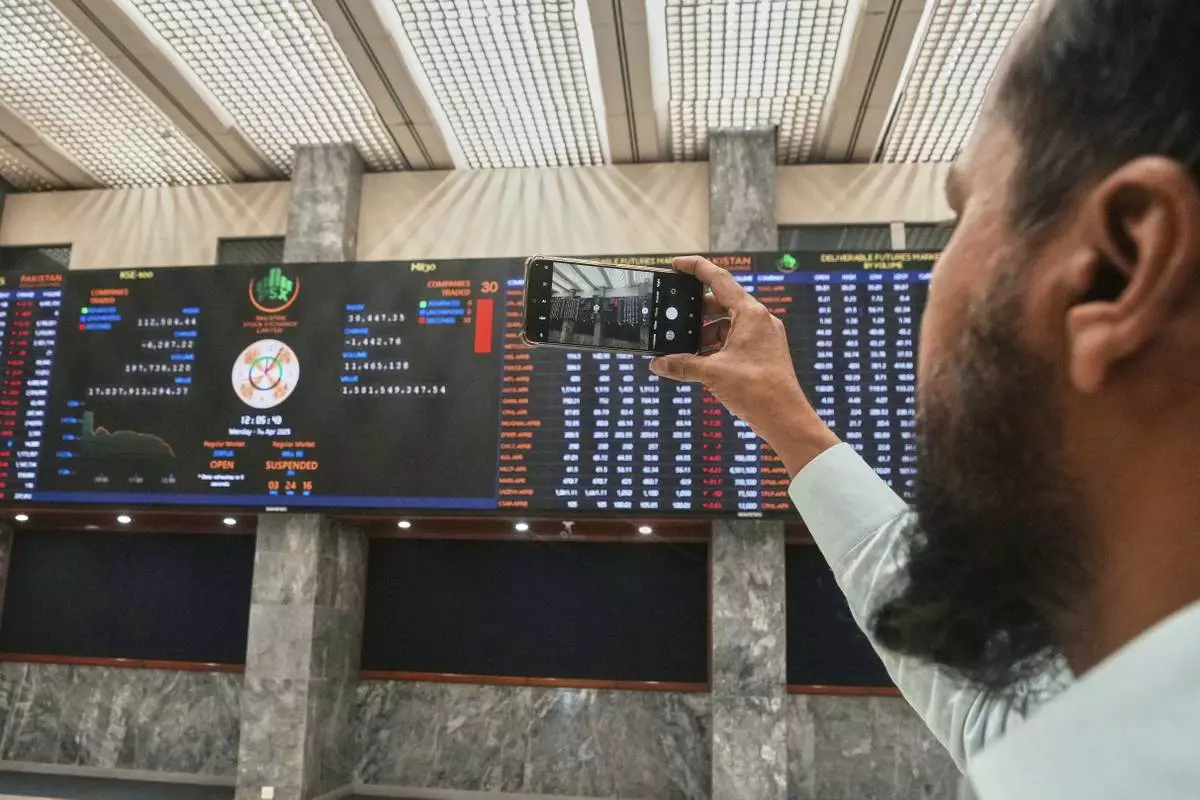
An investor takes a picture with a cell phone of indexes and benchmark 100 index at the Pakistan Stock Exchange (PSE), in Karachi, Pakistan, Monday, April 7, 2025. (AP Photo/Fareed Khan)

Emiratis are seen in the Dubai Financial Market in Dubai, United Arab Emirates, Monday, April 7, 2025. (AP Photos/Fatima Shbair)
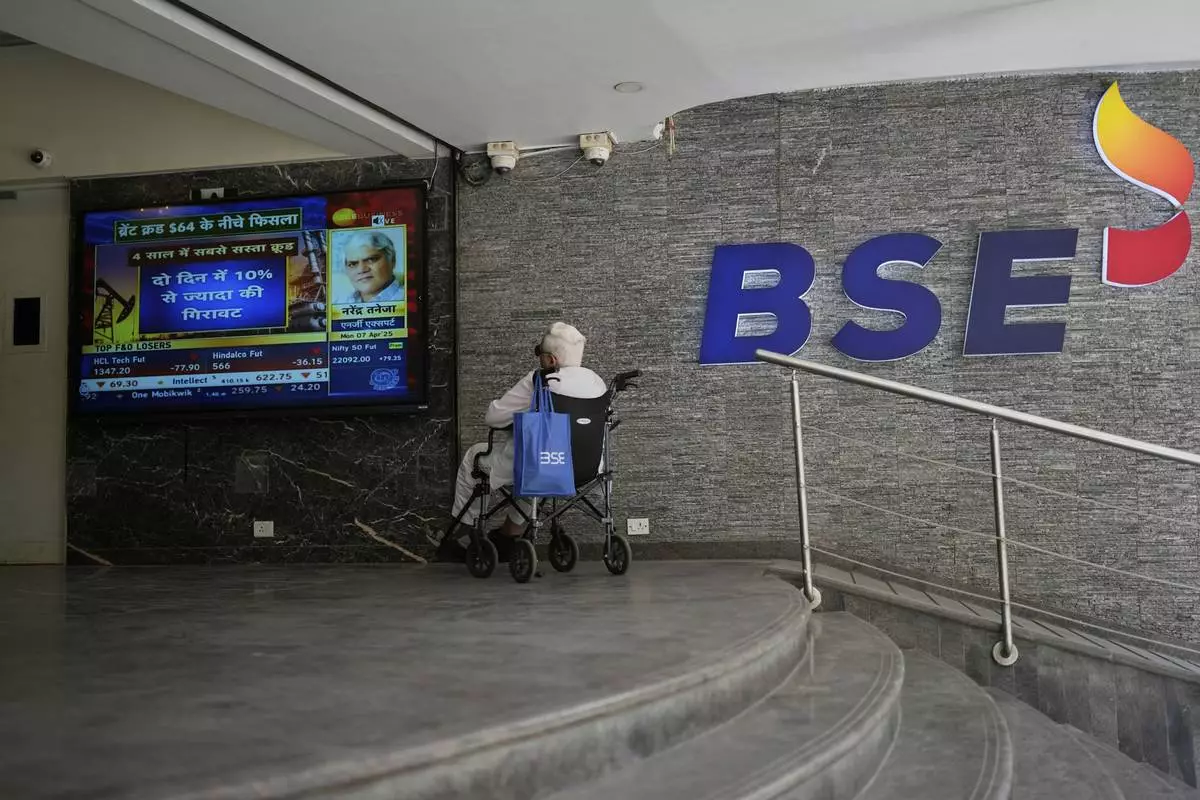
A man sits on a wheelchair and watches a live screen outside Bombay Stock Exchange (BSE) building in Mumbai, India, Monday, April 7, 2025. (AP Photo/Rajanish Kakade)
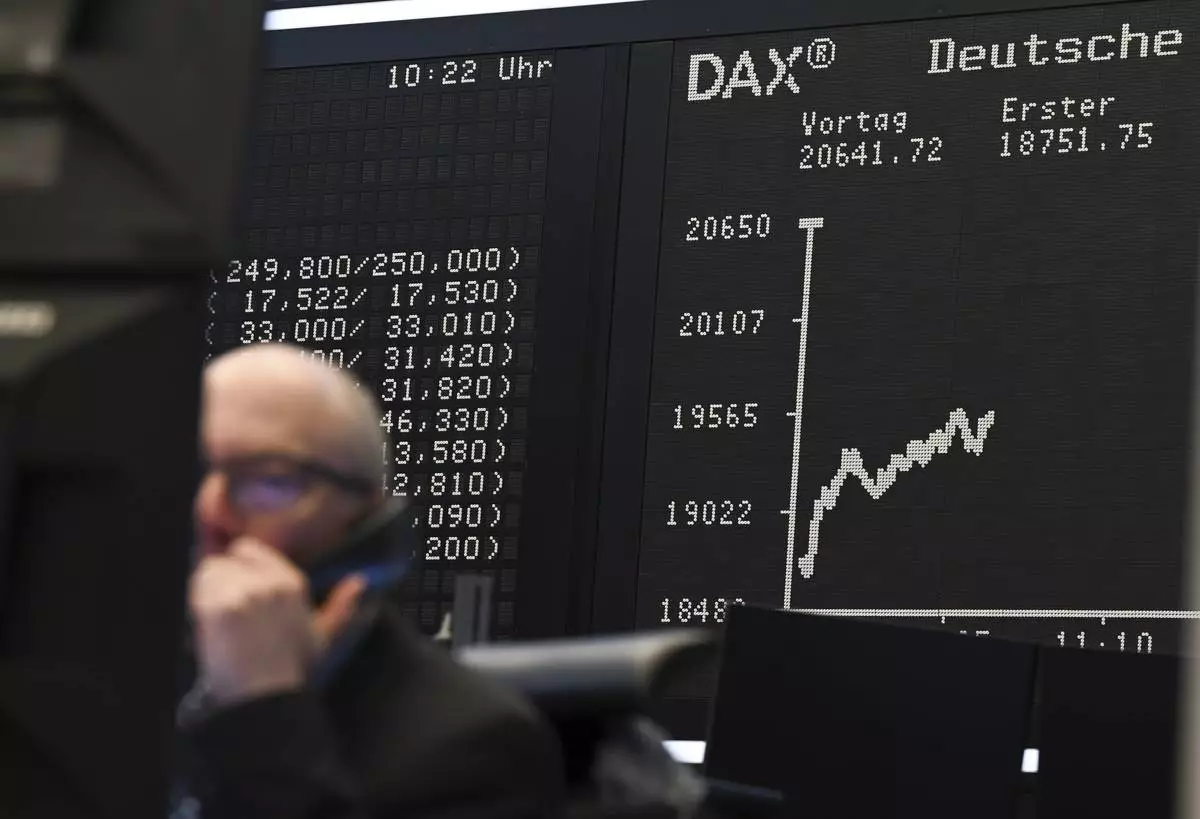
While a stock exchange trader sits in front of his monitors on the trading floor of the Frankfurt Stock Exchange, Germany, the display board with the Dax curve shows a value of less than 20,000 points. (Arne Dedert/dpa via AP)
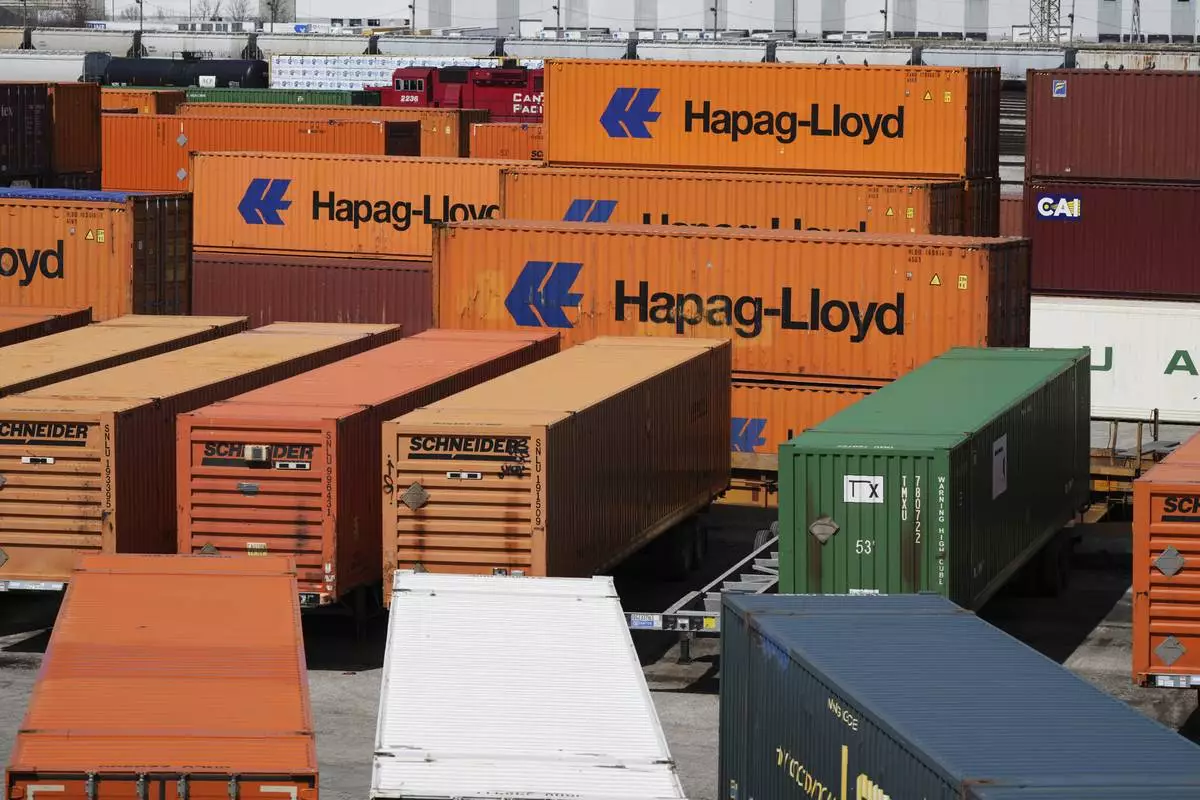
Shipping containers are stored at Bensenville intermodal terminal in Franklin Park, Ill., Sunday, April 6, 2025. (AP Photo/Nam Y. Huh)

Currency traders work near a screen showing the Korea Composite Stock Price Index (KOSPI), top left, and the foreign exchange rate between U.S. dollar and South Korean won, top center, at the foreign exchange dealing room of the KEB Hana Bank headquarters in Seoul, South Korea, Monday, April 7, 2025. (AP Photo/Ahn Young-joon)




